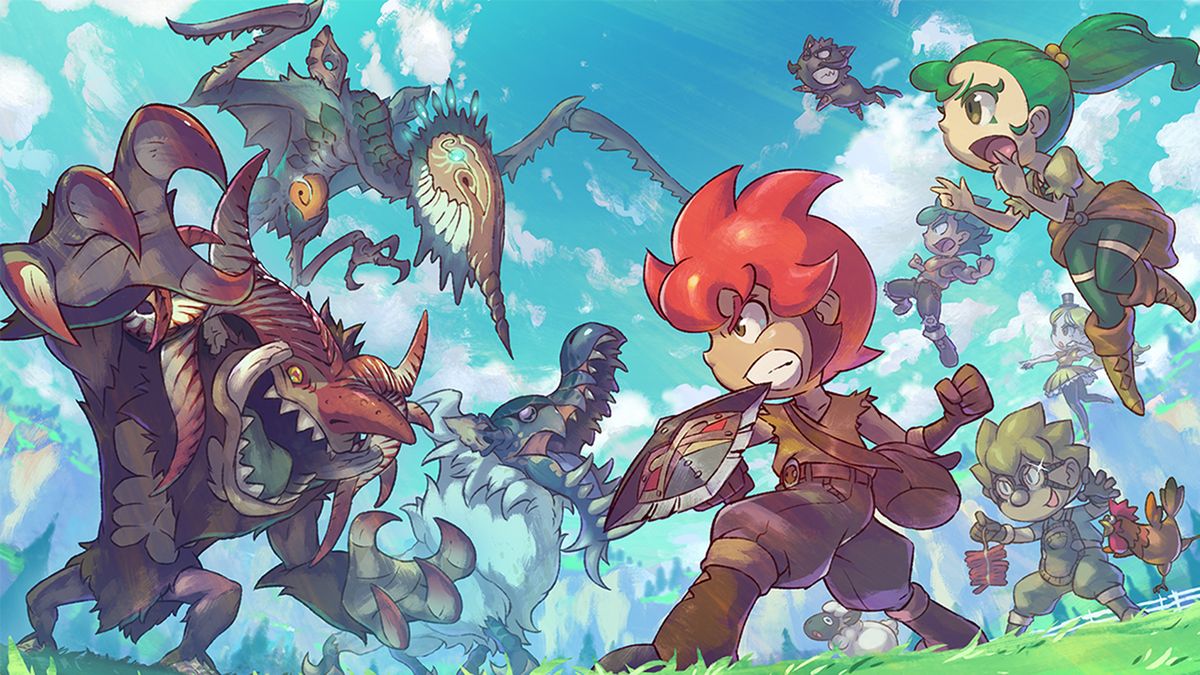Cubetractor is a 16-bit action-puzzler that’s simple enough, stylistically and mechanically, to have been released as a console game in the mid-’90s. That’s how it gets you. It has a two-button control scheme that can be mastered in seconds, and it’s almost entirely unburdened by a story, barring a few conversations here and there in which characters use silly, made-up words like “hrubs” and “waesomes.” It’s unintimidating, which makes its remarkable depth and often grueling difficulty all the more startling. It lulls you in with its old-school charm and then promptly makes a mess out of you, in very satisfying ways. One of the cutest games in quite some time is also one of the most brutal.
The premise is that Endroi, an enthusiastic robot with disturbingly large lips, has the ability to pull blocks toward him from any distance. For the first handful of missions, this is just an unorthodox method of destroying enemies, but then developer Ludochip throws another element into play: tower defense. By combining certain cube types, Endroi can build various structures, such as turrets and barriers, required to circumvent enemy fortifications. Out of nowhere, a game about flinging blocks is also a game about waging war. It combines simple mechanics and familiar influences to create an experience not quite like anything else on the market.

“One of the cutest games in quite some time is also one of the most brutal.”
Cubetractor is challenging on multiple levels, and that’s what makes it a successful puzzle-action game. Simply figuring out what to do with the cubes scattered throughout each stage–all placed in very deliberate locations–is mentally trying. You need to know how to outsmart homing missiles, how to quickly and efficiently shoot through blockades, and how to keep your turrets focused on objectives when things like decoys and enemy spawners come into play and draw attention. There are only three cube types, but the number of possibilities presented in each mission, both in the possible placements of structures and in the structures themselves, is quite versatile.
Then there’s the raw, physical skill required to actually outmaneuver traps, dodge projectiles, and coordinate your own attacks. You need to ensure that Endroi never gets crushed by his own flying blocks, and even the simple act of positioning defenses often requires rigid timing, particularly when pulling cubes from different directions. If Cubetractor has a flaw, it’s that the controls are occasionally just the slightest bit imprecise–not criminally so, but when Cubetractor so frequently demands flawlessness in both planning and execution, it’s frustrating when Endroi’s movement isn’t as responsive as you need it to be. Additionally, Endroi comes to a dead halt for two whole seconds every time he takes damage, which often feels like a needless handicap.
Cubetractor is a fairly short game if you stick to the primary path, but you can easily double or triple your play time if you engage in the rather extensive number of optional missions. Level layouts aren’t consistently perfect, as you’ll occasionally stumble upon clunky solutions that don’t feel intended on the developers’ end, but for the most part, Cubetractor is clever and well-designed throughout. Missions also award star ratings based on item pickups and completion times, giving the game more replay value than your typical puzzler.

“…one of those rare games that almost always seems to have a new trick up its sleeve, and yet never betrays its own simplicity.”
As an homage to video games of the 8- and 16-bit eras, Cubetractor succeeds on virtually every level. The character designs and animations are absolutely adorable, the music is catchy and upbeat, and the whole thing just exudes the sort of charm that’s largely missing from current releases. That’s an understandable effect of newer games needing to look and feel more realistic, but it’s quite refreshing to be reminded of times when artists had to impress with more limited means. The only real hitch in Cubetractor’s presentation is its humor. The quirky dialog earns some chuckles here and there, but it just as frequently feels overly self-conscious.
Cubetractor was apparently developed by only two people, and it’s a prime example of less being more–the audiovisual presentation is delightful in ways that transcend technology, and its uncomplicated control scheme masks unprecedented depth and often alarming intensity. It’s also one of those rare games that almost always seems to have a new trick up its sleeve, and yet never betrays its own simplicity. Ludochip may not be a large team, but they’re definitely one to watch, as it takes considerable talent merely to conceive of a game as ingenious as this, and even more to craft one that lives up to such a premise.
 Game News Video Games Reviews & News
Game News Video Games Reviews & News



